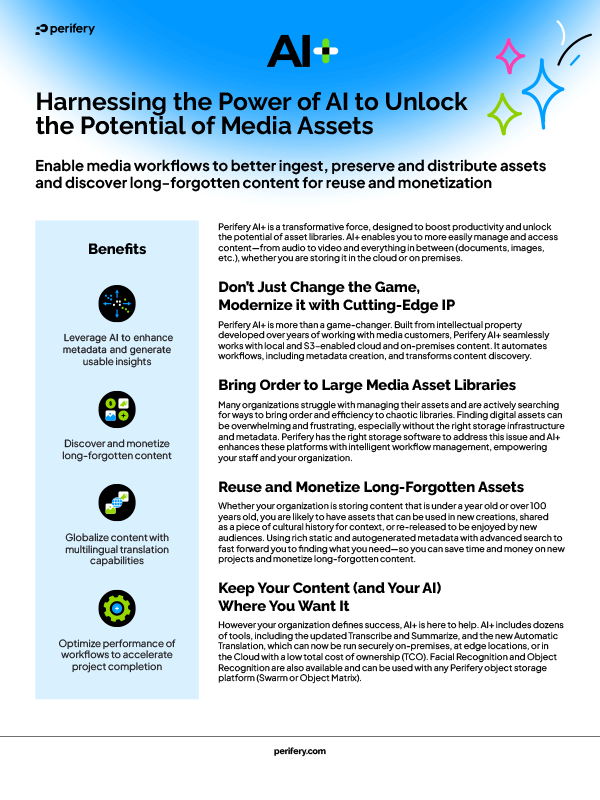
In our latest white paper, The Evolution of Media Archiving, written by Jonathan Morgan, SVP Product and Technology at Perifery, the current state and future considerations of archiving goes under the microscope. Despite holding huge value, keeping media assets secure and accessible over extended periods of time has been somewhat of a challenge for many companies in the M&E sector. In our previous blogs, we’ve explored the importance of preserving media and summarized Jonathan’s 10 foundational principles for preserving archives for 100+ years.
In this blog, we explore how vendors can support long-term archiving goals. With the rapid advancements in the media industry, it's crucial to adopt a resilient and future-ready approach to archiving. Lock-ins are posing significant challenges for media archivists; a proprietary approach significantly impacts an organizations’ ability to respond to evolving and dynamic demands of media archive workflows.
Problems with vendor lock-ins
One of the main issues of vendor lock-ins is the lack of flexibility they enforce. And with the media sector being diverse and dynamic, the need to react and adapt quickly is crucial. Archivists need to respond rapidly to changing requirements and workflow needs, but vendor lock-ins often cause restrictions in their ability to stay responsive and agile. When confined to a single vendor, organizations are essentially bound to a specific set of tools that may not align optimally with their needs. This lack of flexibility can also lead to issues with scalability, meaning archives can’t expand as needed, or if they can, archive owners are hit with unavoidable costs.
The diversity of media formats and technological standards requires a high degree of interoperability, which enables seamless integration of different systems. However, single vendor lock-ins can lead to issues when needing to exchange data with other systems or collaborate with external teams. The inability to integrate diverse technologies into workflows can leave media archivists isolated against sharing and migrating assets.
As well as the operational challenges, lock-ins leave archivists vulnerable to vendor risks. Structural changes, discontinuation of products, or the unfortunate scenario of a vendor going out of business can have severe consequences. Archivists may face the sudden loss of support, updates, and even access to their systems, jeopardizing the integrity and accessibility of valuable data.
However, by evaluating and choosing solutions that prioritize flexibility, interoperability, and innovation, archive teams can ensure the longevity and relevance of their archives.
The future is open
In contrast to providers that lock customers into their systems, there are vendors that support open formats. Unlike restrictive lock-ins, these vendors encourage interoperability and data exchange across platforms. When organizations choose these open formats, they gain the flexibility that will ensure future archivists can pick the best tools for preserving assets. With open formats, data can easily move between systems, ensuring assets remain accessible and intact for centuries.
Although it’s important to ensure your archive media is accessible, usable, and moveable now, it’s crucial to consider the future of those assets. Breaking free from proprietary technology is the key to long-lasting preservation.
In our latest white paper, The Evolution of Media Archiving, Jonathan Morgan outlined the key requirements for addressing the 100-year archive:
- Secure control of security tokens
- Transportable data storage digital governance policies
- Flexibility for data to exist in various technologies and formats
- Metadata stored for future accessibility and understanding
- Full auditing options, with open audits readable without reliance on specific software
Unconstrained by proprietary formats or technologies, archivists can ensure that their assets remain “secure; retained in a bit-perfect form; protected from hostile action, system failures and natural disasters; and accessible indefinitely.” (as defined by Jonathan Morgan in the white paper)
